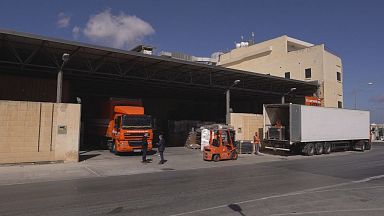Business Planet goes to Malta to see how one logistics company is delivering success through its innovative use of the internet.
Once only the largest firms could afford to pay for the best digital tools, but rapid advances in online technology, smart computing and artificial intelligence mean that even the smallest companies can now take advantage of the latest systems to boost their business.
 ADVERTISEMENT
ADVERTISEMENT
 ADVERTISEMENT
ADVERTISEMENT
Driving a business forward
At first glance, Express Trailers looks like a traditional logistics business, and to some extent that’s true. Founded in 1945, it is now one of Malta’s largest commercial transport companies, shipping internationally across land, sea and in the air.
More recently, however, the firm has gone on a transformational technological journey. Faced with changing consumer patterns, brought on by the rise of the internet, the business invested in a digital platform to bring it into line with the logistic industry’s giants.
“Online shopping has brought in a different type of customer,” explains Franco Azzopardi, the firm’s Chairman and CEO, adding:
“This software that we’ve developed helped us to actually cater for that customer. But it [has also] changed the mindset, the way we present ourselves, the way we communicate because the end consumer is different to the business customer.”
The e-commerce platform - shiplowcost allows the company to offer both private individuals and retailers the possibility to ship goods from around Europe, at any time of the day and week, with fewer restrictions and expenditure than it did before.
Since introducing the new e-commerce platform the company has seen a CAGR (Compound Annual Growth Rate) of 80 per cent year on year in the Business 2 Customer line in the last 5 years
Part-funded with a grant from the European Regional Development Fund the online system is especially favoured by retailers in Malta to send goods to customers elsewhere in the world.
Embracing digital development
But the firm’s ambitions don’t stop there. In addition to the new e-commerce platform, Express Trailers is integrating artificial intelligence and other predictive technologies into its commercial transport business to maximise both storage and delivery efficiency.
The company has also recently built a large warehouse facility in the Italian port of Genoa. This will enable it to offer storage services in mainland Europe, allowing retailers, both in Malta and the wider EU, to significantly cut costs when it comes to managing and storing stock.
“Commerce is about speed - technological speed,” insists Azzopardi, going on to explain: “From warehousing to picking, packing, delivering, [by] adopting web-based technologies, adopting artificial intelligence in our transport management systems and new investment in warehouse management systems, all towards a faster turnaround for our customer.”
Express Trailers is the exception rather than the rule. It is estimated that only about 17 per cent of small and medium-sized enterprises (SMEs) in Europe have become highly digitalised. That compares poorly with larger companies, where more than half (54 per cent) have successfully integrated new digital systems into their business.
In an effort to change those figures and help SMEs seize opportunities connected to digitalisation, the EU has just unveiled its new SME strategy.
As well as offering support and training through networks like the Enterprise Europe Network this new strategy will seek to fund companies wishing to digitalise their business.
David Xuereb is President of the Malta Chamber of Commerce, Enterprise and Industry. Business Planet spoke met him to find out more about what help is on offer for firms looking to integrate digital tools into the workplace.
In terms of EU support, what is available for companies wishing to seize the opportunities with digitalisation?
“The EU offers a number of opportunities and a number of schemes that help businesses connect up with the tech world. Many grants focused on ensuring increased commerce, increased internationalisation, increased investment, research and innovation. Certainly, Horizon 2020 is also another area that helps not only start-ups but also developed institutions and organisations and businesses develop their next steps in their growth objectives, according to their business plan.”
What’s being done in Malta to help small and medium-sized businesses transition to the new digital reality?
"Infrastructure wise this country has done a lot. The Chamber of Commerce has always been supportive in high broadband digital technologies and availabilities - including fibre in the home now - where Malta is pretty much fibre ready. The second is education, we need talent, we need to ensure, and we are working to ensure that our younger children in schools are well prepared for the digital technologies they will face when they move into the working life. Thirdly of course, if not the most important, is our public-private partnership with the government of Malta, through the form of an institution called Tech MT, which ensures that our businesses are offered the right advice - personalised advice - to make sure that they make the right steps, at the right time, in the right direction, every time.”
What would your tips be for companies wishing to embrace digitalisation?
“Our public-private partnership, the Chamber of Commerce’s partnership with the government of Malta – through Tech MT – is an institution, an organisation, a tool if I may, that enables focused attention on what it is that people and our members should be focusing and working on. These are personalised recommendations and advice, which should be coupled with the various tools and grants that the EU will be providing, to ensure that their objectives are met.”
Useful facts
Digitalisation and new technologies can provide great business opportunities for SMEs: they can improve efficiency, productivity and innovation in terms of both products and business models.
Many SMEs are slow in their uptake of digital technologies, especially compared to larger companies. For example, while 54% of large companies are highly digitalised, only 17% of SMEs have successfully integrated digital technologies into their business.
One of the main objectives of the new EU SME strategy is to help SMEs seize the opportunities of digitalisation, data-driven innovation and AI. This includes increased funding for companies willing to digitalise, and support and training through different networks such as Enterprise Europe Network and European Digital Innovation.












